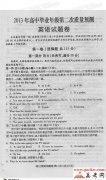山大附中2012年一模拟英语试题答案(3)
2012-05-10 22:32:04
53. A. idea B. faith C. feeling D. opinion
54. A. otherwise B. indeed C. worse D. rather
55. A. panic B. connection C. humor D. home
第三部分 阅读理解(共20小题;每小题2分,满分40分)
第一节 阅读下列短文,从每题所给的四个选项(A、B、C和D)中,选出最佳选项。
A
One night, as Diaz stepped off the train and onto a nearly empty platform, a teenage boy approached and pulled out a knife.
“He wanted my money, so I just gave him my wallet and told him, ‘Here you go ’” Diaz says.
As the teen began to walk away, Diaz told him, “Hey, wait a minute. You forgot something. If you’re going to be robbing people for the rest of the night, you might as well take my coat to keep you warm.”
The robber looked at him puzzled, saying, “Why are you doing this?”
Diaz replied, “If you’re willing to risk your freedom for a few dollars, then you must really need the money. I mean, all I wanted to do was get dinner and if you really want to join me…..”
Diaz says he and the teen went into a diner and sat in a booth.
“The manager comes by, the dishwashers come by, the waiters come by to say hi,” Diaz says.
The kid said, “You know everybody here. Do you own this place?”
“No, I just eat here a lot,” Dias said. “But you’re even nice to the dishwasher,” he said.
Diaz replied, “Well, haven’t you been taught you should be nice to everybody?”
“Yea, but I didn’t think people actually behaved that way,” the teen said.
When the bill arrived, Diaz said, “You’re going to have to pay for this bill because you have my money and I can’t pay for this. So if you give me my wallet back, I’ll gladly treat you.”
The teen returned it immediately. “I gave him $20…. I figure maybe it’ll help him.” Diaz says he asked for something in return--- the teen’s knife--- “and he gave it to me.”
Afterwards, when Diaz told his mother what happened, she said, “You’re the type of kid that if someone asked you for the time, you gave them your watch.”
“I figure, you know, if you treat people right, you can only hope that they treat you right. It’s as simple as it gets in this complicated world.”
56. What did Diaz do to the teen?
A. He gave the teen a new wallet B. He treated the teen to dinner
C. He gave his coat to the teen D. He taught the teen a lesson
57. From the passage we can infer that the boy _______.
A. expressed his gratitude for Diaz’s kindness
B. gave up the idea of robbing in the end
C. wasn’t taught how to be nice to everybody
D. gave the knife to Diaz in return for his forgiveness
58. For what Diaz did, his mother showed an attitude of _______.
A. complaint B. concern C. criticism D. praise
59. By telling the story of Diaz, the author intends to tell us ______.
A. to keep calm in danger B. not to go out alone at night
C. to treat others kindly D. not to harm others on purpose
B
Encouraging pupils to keep noise to a minimum should be a valuable component of all children’s education, according to new research.
Dr. Helen Lees, from Stirling University’s school of education, says that “enforced(强制的)silence” is seen as a punishment and often acts to suppress children’s natural ability. But she says that teaching children about the benefits of “enforced silence”,--- deliberate stillness that gives them the opportunity to focus and reflect in a stress-free environment--- can have a significant effect on pupils’ concentration and behavior.
It is the latest in a string of researches to establish a link between the classroom environment and pupils’ academic ability.
A study almost a decade ago in London found that children’s exam results were cut by as much as a third if they were taught in noisy classrooms. Teaching unions have also called for a limit of 26℃ to be put on classroom temperatures because teachers and pupils struggle to work in hot conditions, and some educationalists claim that too much clutter(杂乱的东西)on classroom walls can prevent children from concentrating.
Dr. Lees said, “When we take some research on school settings and put it all together, what we see is that education without silence does not make much sense. In areas of better learning outcomes, better self- confidence and well-being measures, enforced silence in a person’s life and an individual’s education is shown throughout the relevant research to be a benefit.”
Dozens of schools across Britain have already introduced periods of “reflective silence” into the timetable.
Kevin Hogston, head of Sheringdale Primary, south London, has just introduced a minute’s silence at the start of twice-weekly meetings in which children are taught breathing techniques and encouraged to reflect. The school plans to introduce it into classrooms every day.
60. According to Dr. Helen Lees, “enforced silence” __
A. is an effective way of punishment B. does not make much sense in class
C. can improve pupils’ confidence D. makes pupils more creative
61. The underlined word, “suppress”, in the second paragraph probably means “_________”.





